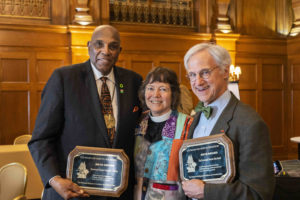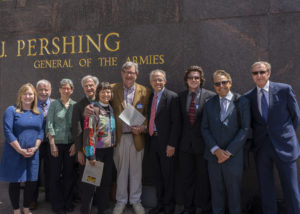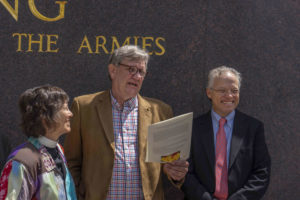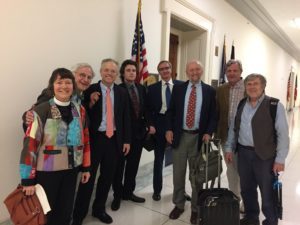What is an emergency? Merriam-Webster defines emergency as “an unforeseen combination of circumstances or the resulting state that calls for immediate action.” Does climate change count as an emergency? Not if an “emergency” is necessarily “unforeseen,” for when it comes to climate change, scientists have been sounding the alarm for decades, telling us that burning massive quantities of fossil fuels would lead to catastrophe. Of course, the fossil fuel industry (see #ExxonKnew) has spent millions of dollars trying to make the climate emergency as “unforeseen” as possible, for as long as possible, to as many people as possible. But the clock has run out. The time of reckoning is at hand. Foreseen or unforeseen, the climate crisis is upon us and it calls for immediate action.

In the same week that the U.K. became the first country to declare “an environment and climate emergency,” and in the same week that the Anglican Communion became, as far as I know, the first global religious body to recognize a climate emergency, National Religious Coalition for Creation gathered for its 20th annual prayer breakfast in Washington, DC. NRCCC is a group composed of members of major faith groups in America, including Catholic, Protestant, Evangelical, and Orthodox Christians, and Jews. After opening prayers, a lively presentation by Chad Hanson (Director of the John Muir Project) on forest protection as an essential aspect of addressing climate change, and the bestowal of the 2019 Steward of God’s Creation award to two outstanding climate champions – the Rev. Dr. Gerald L. Durley and the Rev. Dr. Jim Antal – we moved outside to announce the release of Religious Declaration of Unprecedented Climate Emergency.
Religious Declaration of Unprecedented Human Emergency clarifies two essential facts: humanity has an extremely short window of time in which to avert irreversible climate chaos, and religions around the world consider protecting God’s Creation a moral and spiritual imperative.
Perhaps it was fitting that the Religious Declaration was publicly announced in Pershing Park, a National World War I Memorial. Just as William James and Jimmy Carter spoke of “the moral equivalent of war,” so, too, are increasing numbers of citizens realizing that we need to address climate change with the same focus, fervor and self-sacrifice of a nation that is mobilized to fight a war.
The stakes are high. As stated in the opening lines of the Religious Declaration, climate change is unlike any other challenge that confronts humanity, “because it is largely irreversible ‘for 1,000 years after emissions stop’ with ‘profound impacts on global climate, ecosystems and human societies for the next ten millennia and beyond.’1 The shocking truth is that decisions we make now could, in the words of climate economist Ross Garnaut, ‘haunt humanity until the end of time.’2 Nuclear war, while also irreversible, is only a possibility. Human-induced climate change is underway now, and its impacts are greater and more extensive than scientific models predicted. We will significantly alter the future of civilization as we know it and may eventually cause its collapse if we continue down this path.”

The Declaration calls for bold, concerted action: “Decades of delay on climate action have made small corrective measures and incremental approaches useless. Those who are invested in maintaining the status quo, or who put forth proposals that are clearly incompatible with what climate science demands, are condemning innocent young people – including their own children and generations to come – to a future of unimaginable suffering: the mass death of human populations and the extinction of species.”
The Declaration places the climate crisis within a moral context: “Further delay in addressing climate change is a radical evil that as people of faith we vigorously oppose.”
One of the principal writers of the document, Dr. Richard W. Miller, Professor of Philosophical Theology and Sustainability Studies, Creighton University, reflected later on this last point. He commented: “The manufacturing of doubt and the sowing of confusion about climate change by fossil-fuel-industry-funded think tanks, the deceptive climate-change reporting by ideologically-driven media outlets, the investing in fossil fuel infrastructure by banks and high-profile investors, the expansion of pipelines, oil, and gas wells are all radically evil actions that continue to this day. The institutions that engage in these actions are enemies of humanity and the web of life. We will oppose these institutions from our churches and synagogues, from our pulpits and lecterns, and from our social halls and gathering spaces. We will fill the halls of power like the young people in the Sunrise Movement in their push for a Green New Deal; we will join school-aged children in the streets striking for climate action; and we will rebel with the young people in the Extinction Rebellion in the race to head off the destabilizing of the climate system within which civilization developed.”
I, too, was one of the principal authors of the Religious Declaration, and in our press release, I commented: “God sent us into the world to bless and heal, not to ravage and destroy. But as a species we are hurtling willy-nilly down a suicidal path that risks bringing down not only our own civilization but also the web of life as it has evolved for millennia. As people of faith, we stand with the Spirit of life, who calls us to build a more just society in which all people and all God’s creatures can thrive.”

The third lead author of the Religious Declaration, inventor and tech business entrepreneur David W. Carroll, asserted: “There is no moment more critical for all-out personal and cooperative action. Today’s environmental emergency demands we implement solar and wind with power storage immediately. It is ready, and it provides unequalled economic value. Let us not fail in our duty to serve and protect Planet Earth.”
The Declaration amplifies statements that major denominations have already issued on climate change. Religious groups across the United States, including the National Council of Churches, U.S. Conference of Catholic Bishops, Central Conference of American Rabbis, National Association of Evangelicals, and the Standing Conference of Canonical Orthodox Bishops, have all called upon policymakers and elected officials to take strong action to address global climate change.
Are there risks in declaring climate change an “emergency”? I will name two. One risk is that the moment will be wasted – the proposed solutions will be weak and ineffective. A recent blog post from Council Action in the Climate Emergency (CACE) explains: “As climate emergency talking and thinking shifts further towards climate emergency action, it is imperative that ‘climate emergency’ is not co-opted to mean something ‘convenient’ or ‘pragmatic’ (i.e. weak goals and slow action). Climate emergency has to stand for safe climate principles for restoring a safe climate.” (The article, which is by Bryony Edwards, goes on to propose how to set targets for climate emergency emissions.)
A second risk in declaring a climate emergency is that political and corporate powers could thereby be given free rein to consolidate their advantages and shut out the people who suffer the most. Casey Williams, a writer in North Carolina, points out in an article for The Outline, “…Given that the American right seems to be quietly coming around to the reality of climate change (despite some high-profile acts of denial), ‘national emergency’ rhetoric and policy could easily become a conservative strategy for dealing with climate change by building ‘big, beautiful walls’ to exclude various Others from America’s relative stability. Meanwhile, the wealthy in the U.S. and around the globe will continue to erect seawalls around their coastal villas and hire private firefighters to protect their Malibu mansions. The real tragedy of treating climate change as an emergency, rather than an uneven distribution of physical and social harm, is that it would worsen the inequality that brought us to this point in the first place.”
In my view, the Religious Declaration of Unprecedented Human Emergency successfully avoids both risks. It presents a menu of effective solutions. And it also lifts up the need to tackle both the ecological and the economic crises. As Pope Francis stated in his encyclical, Laudato Si’, we need to hear both the cry of the Earth and the cry of the poor – neither one can be adequately addressed alone.
That is why Religious Declaration supports “the bold direction of the Green New Deal, or other similar science-based proposals, as an opportunity for this country to commit to stabilizing the climate while creating ‘unprecedented levels of prosperity and economic security for all people of the United States.’ This specifically includes low-income communities, communities of color, and those that have historically been marginalized or underserved. The Green New Deal is the first resolution that addresses the climate crisis with the urgency, focus, and comprehensiveness that the situation requires. Our nation mobilized every part of society during World War II and the Great Depression. Like the Greatest Generation, we must rise to the occasion and commit to doing what science says it takes to avoid irreversible catastrophic climate chaos and make a rapid and just transition to a clean energy economy.”

- Other interfaith groups also support the Green New Deal. GND is not a piece of legislation, but a statement of vision and values. To sign “Faith Principles for a Green New Deal” sponsored by Interfaith Power & Light, click here. To learn more about the Green New Deal and to sign a GreenFaith statement of support, click here.
The NRCCC’s Religious Declaration of Unprecedented Human Emergency has been signed by religious leaders across the country, including heads of denominations, bishops, clergy, and leaders of interfaith environmental organizations. Here are some of the religious leaders who signed the Declaration: Rev. John Dorhauer (General Minister and President, United Church of Christ); Rt. Rev. Marc Andrus (Bishop, Episcopal Diocese of California); Rt. Rev. Doug Fisher (Bishop, Episcopal Diocese of Western Massachusetts); Rt. Rev. Gregory H. Rickel (Bishop, Episcopal Diocese of Olympia, Seattle, WA); Rt. Rev. A. Robert Hirschfeld (Bishop, Episcopal Church of New Hampshire); Rt. Rev. Alan M. Gates (Bishop, Episcopal Diocese of Massachusetts); Rt. Rev. Roy F. (Bud) Cederholm Jr. (Retired Bishop Suffragan, Episcopal Diocese of Massachusetts); Rev. Fletcher Harper (Executive Director, GreenFaith); Phoebe Morad (Executive Director, Lutherans Restoring Creation); Rabbi Warren Stone (Central Conference of American Rabbis), Rabbi Benjamin Weiner (Jewish Community of Amherst, MA); Rabbi Alison Adler (Temple B’nai Abraham, Beverly, MA); Rabbi Moshe Givental (West Bloomfield, MI); Rabbi Katy Z. Allen (Jewish Climate Action Network, Wayland MA); Rev. Dr. Jim Antal (Special Advisor on Climate Justice to UCC General Minister and President); Rev. Brooks Berndt, Ph.D. (Minister for Environmental Justice, United Church of Christ); Rev. Mariama White-Hammond (Pastor, New Roots AME Church, Boston); Rev. Fred Small (Minister for Climate Justice, Arlington Street Church, Unitarian Universalist, Boston).
I will give the last word to a rabbi and a pastor. Each of them was moved to write a short response to the Religious Declaration, praying that it would reach many minds and hearts.
Rabbi Warren Stone (Central Conference of American Rabbis and Co-chair of NRCCC) wrote: “We must act boldly and with vision to stem the tides of climate change’s devastating impact on humanity and all God’s creation. May we look back on our day and age and say that we saw what was happening to the climate and we acted with courage and prescience to do what was necessary to cut our CO2 emissions and dramatically reduce the threats of climate destruction for future generations.”
The Rev. Dr. Jim Antal (Special Advisor on Climate Justice to UCC General Minister and President) wrote: “Momentum is growing as congregations from every faith tradition are shifting their focus from personal salvation to collective salvation. Along with the outspoken voices of children and youth, people of faith are declaring that we are now in a time of reckoning. To continue ‘business as usual’ as the corporate powers insist is morally bankrupt. God is calling us to re-build our economy and center our lives on sustainable, earth-restoring values and practices.”
Religious Declaration of Unprecedented Human Emergency is posted at the NRCCC Website and can be read and downloaded here.
1. Susan Solomon, Gian-Kasper Plattner, Reto Knutti, Pierre Friedlingstein, (2009) Irreversible Climate Change Due to Carbon Dioxide Emissions,” Proceedings of the National Academy of Sciences, 106 (6) 1704-1709, at 1704; DOI:10.1073/pnas.0812721106; and Peter U. Clark et al, (2016). Consequences of Twenty-First-Century Policy for Multi-Millennial Climate and Sea-Level Change.Nature Climate Change. 6.10.1038/nclimate2923.
2. http://www.garnautreview.org.au/pdf/Garnaut_Chapter24.pdf (last lines of the review)
https://cosmosmagazine.com/climate/ross-garnaut-s-bright-idea.
